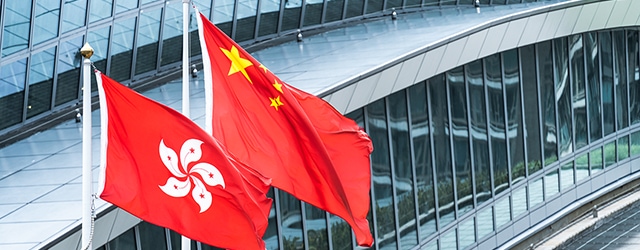Protests aren't the only factor dampening Hong Kong's economy.

As clashes between protestors and police continue, Hong Kong’s economic situation is getting more dire. For the first time in a decade, the territory has slipped into recession. After five months of unrest, political instability is clearly a factor when it comes to Hong Kong dwindling fortunes but it not the only headwind, say experts.
“The recession cannot be attributed solely social unrest but it is certainly aggravating it massively,” Alicia Garcia Herrero, chief economist for Asia-Pacific at investment bank Natixis, tells Global Finance.
For three months to September Hong Kong’s GDP shrank 3.2%from the previous quarter. This follows a0.4% drop the previous quarter—meaning a technical recession. Before the figures were revealed, Hong Kong’s chief executive Carrie Lam said that special administrative region was likely to miss the government revised forecast of 0%-1% for 2019.
Hong Kong’s financial markets also continue to take a massive hit. This week, the Hong Kong stock exchange saw its biggest single day decline in three months, dropping 2.6% on Monday, continuing a downward trajectory that started with the protests in June. The US has called on both sides to de-escalate the violence, but even if Hong Kong overcomes its political impasse, its economy faces an uphill struggle.
Like Natixis’ Garcia Herrero, Gary Hufbauer, an economist and non-resident senior fellow at the Peterson Institute for International Economics, says domestic politics are just part of Hong Kong’s problem. He notes that the recession owes just as much to trade wars.
“An awful lot of US exports to China, and imports from China, pass through Hong Kong,”he says. “Bilateral US-China trade volumes are down about 15%-20% thanks to the trade war.Moreover, global merchandise trade will only grow 1.2% in 2019 [per DG Azevedo] and global services trade won’t do much better.”
Asia’s other big trading hub, Singapore, has also taken a hit from the trade war, although not as badly as Hong Kong, according toHufbauer.While growth has been lackluster, the city state’s Ministry of Trade and Industry still expects growth to be 0% to 1% for 2019. Furthermore, as Singapore stands to gain as business and capital moves out of Hong Kong. Investment will be needed to reverse the trend.
“The way out of recession for Hong Kong is, first, a massive fiscal stimulus,” argues Herrero. “Second, [is] a commitment to keep HK’s intrinsic benefits, such as the rule of law and judiciary independence. If there is doubt about the latter, which is obviously the case these days, Hong Kong will continue to lose steam as a major international financial centre.”
The Chinese governmentseems unwilling thus far to give ground to protestor demands. The “one country, two systems” approach that has sustained Hong Kong since the British handover no longer seems to work.
“For the future, Beijing has every reason to want a prosperous Hong Kong,” says Hufbauer. “My guess is that President Xi will deftly use everytool at his disposal to quiet the unrest.Perhaps some political concessions will do the trick.Heavy handed use of the army will cast a pall over HK for years.”



